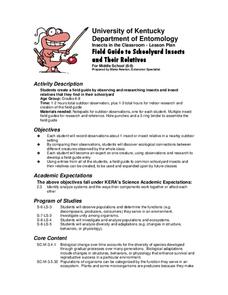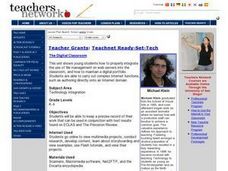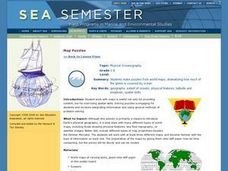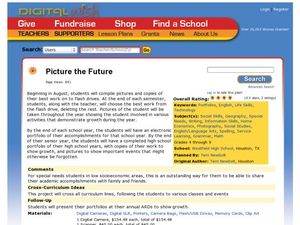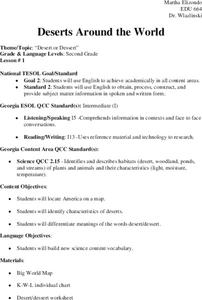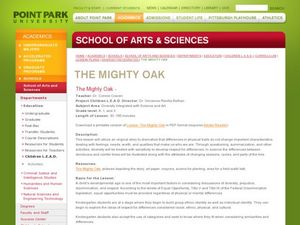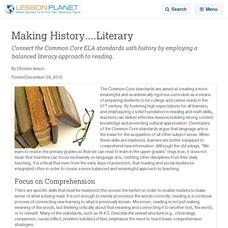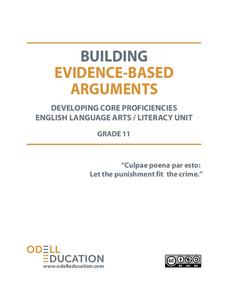Orange County Department of Education
Katie's Trunk
Fifth graders read the story of "Katie's Trunk". They identify the traits of integrity and fairness in the characters John Warren and Katie. Students explore how people can experience the same event but interpret it differently. They...
Curated OER
How High Are the Clouds?
Students analyze height and collect data to create a graph. In this statistics lesson, students use central tendencies to analyze their data and make predictions. They apply concept of statistics to other areas of academics to make a...
Curated OER
Field Guide to Schoolyard Insects and Their Relatives
Your entire class works together to create an illustrated insect field guide. The intent is that they venture outside of the classroom, find a critter, and then research it using reference materials, insect books, and the Internet for...
Curated OER
Water as a Cycle
Students collaborate with a partner to create a large diagram containing one aspect of the water cycle. They are encouraged to include academic language and pictures for their presentation. Their is a peer evaluation sheet that is...
Curated OER
Technology: The Digital Classroom
Students discover how to integrate file management systems on Web servers into the classroom. In addition to maintaining digital portfolios, they develop various Internet functions such as authoring directly onto an Internet domain.
Curated OER
Charting Our Waters
Students create an attribute chart to organize their learning about water. They work with a partner to incorporate academic vocabulary to complete their chart. Students may volunteer to share their charts with the entire class.
Curated OER
Recycling Quest
Young scholars integrate the concept of recycling into an aerobic activity. They incorporate the use of baskets, crates, wrist bands, vests, and bean bags, They play a remote game until all the "trash" is retrieved.
Curated OER
Frederick Douglass
Fifth graders are introduced to the novel "Frederick Douglass" and conduct research about his life. The lesson integrates technology while using a library database. It is used as a source of information with access to a reference...
Curated OER
Map Puzzles
Students make puzzles from world maps, dramatizing how much of the globe is covered by ocean.
Curated OER
From Depression to Death
Tenth graders identify the different types of depression. In this series of health lesson, 10th graders discuss the most common reasons why teens think about suicide. They create a story board about scenarios present and present their...
Curated OER
Picture the Future
Students create a digital portfolio about their activities for several school years. Students compile pictures and copies of their best work onto flash drives. Students combine the pictures and text each year to create a cumulative...
Curated OER
Parts of the Plants
Second graders discuss as a class what they know about plants viewing several pictures of plants as well as a tree poster. They work in groups to observe a flowering plant which is removed from a pot with the soil brushed away and is...
Curated OER
The Mosaic School
Young scholars complete activities to learn about world cultures. In this multicultural lesson, students define the terms diversity, culture, and mosaic. Young scholars research their family's country of origin and complete activities...
Curated OER
From Seeds to Plants
Second graders review the process of plant reproduction and the role of seeds in that process. The students dissect a seed, analyze their finds, collect and record data, and make predictions about seed germination and plant growth.
Curated OER
Deserts Around the World
Second graders explore the deserts around the world. They use a map and locate America on the map. Students discuss and identify the characteristics of deserts and differentiate the meanings of the word desert and dessert. Students...
Curated OER
I Read On My Own!
Students examine how to choose books to read on their own and how to participate in reading discussions. They practice the two finger rule for choosing an independent reading book and how to look at the book's topic for personal...
Curated OER
The Mighty Oak
Students investigate types of trees. For this forestry lesson, students read the book The Mighty Oak and act out the story with a partner. Students discuss the types of trees in the book and plant an oak tree on school grounds.
Curated OER
Allowing Students to Explore Simple Physics and Marketing in English Class
Scientific method, linear measurements, friction, inertia. Imagine learning scientific vocabulary in an ELA class. Before researching and developing a presentation about simple machines, class members build a common, but decidedly...
PBS
Baseball: The Tenth Inning
Bring the historical relevance of baseball into the classroom, as pupils discover the lessons learned from the breaking of baseball's color barrier by Jackie Robinson. Learners view video and analyze Robinson’s character, as well as his...
Annenberg Foundation
Service Learning in the Social Studies
Active Citizenship Today (ACT) is a "unique social studies service learning program" that requires students to learn about the public policy associated with community issues they identify in their local community. This web site...
HealthTeacher
Get More Sleep
Help learners identify habits that interfere with sleep and to understand the importance of adequate rest and its impact on not only physical health, but also emotional wellbeing.
Curated OER
Making History....Literary
Connect the Common Core ELA standards with history by employing a balanced literacy approach to reading.
Curated OER
Growing Learners: A Multi-Disciplinary Approach to Investigating Plants and Flowers
Engage young scientists in these inquiry-based lesson ideas to spring into learning about nature.
Odell Education
Building Evidence-Based Arguments: "Cuplae poena par esto: Let the punishment fit the crime."
Should a criminal's punishment match the crime? An argumentative writing plan explores this question as class members investigate a variety of mixed-medium sources by experts in the field, form evidence-based claims, and support them...




